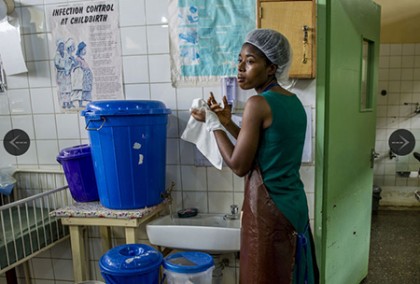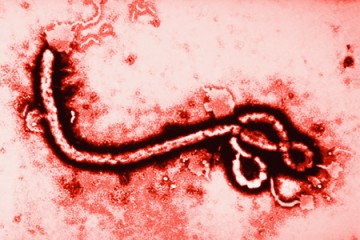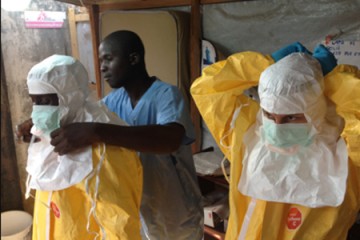With the Ebola crisis in West Africa intensifying, Jhpiego, an affiliate of Johns Hopkins University, has been ramping up efforts to provide critical, lifesaving assistance to the governments of Liberia, Guinea, and Nigeria, including updating the skills of health workers who deliver care to women and families in these countries.
Jhpiego, an international, nonprofit health organization with decades of experience in the region, has worked in partnership with the ministries of health and professional organizations in Liberia, Guinea, and Nigeria, where Jhpiego has offices, to ensure that health workers follow best practices in infection prevention and control assistance (IPC) that will help minimize the spread of Ebola.
Jhpiego has committed new funds to a special Ebola Response Initiative to respond to the health ministries' urgent needs, continue providing technical assistance to address anxiety and fear among health workers, and support the delivery of safe, high-quality health services, especially to vulnerable pregnant women, mothers and newborns.

Image credit: Jhpiego
"The devastating outbreak of Ebola in West Africa has drawn attention to the critical role frontline health workers play in health systems around the world," said Leslie Mancuso, President and CEO of Jhpiego. "Nurses, midwives, and community health workers are often the first and only link to health care for millions of people. Jhpiego is working with our partners to help ensure health care providers are fully informed on infection prevention measures, appropriately trained and empowered to provide lifesaving care in a safe environment."
The intensity and pace of the Ebola crisis has overwhelmed health systems in Liberia and Guinea, exhausting nurses, midwives and other frontline responders; consuming supplies such as chlorine, a key ingredient in ensuring infection prevention and sanitizing equipment; and leaving some health facilities unmanned and ill-equipped to provide routine health services.
To help health workers protect themselves during potential contact with Ebola-related patients, Jhpiego has deployed staff in the three countries to share IPC messages and materials that have been adapted for the Ebola crisis. In Liberia, for example, Jhpiego has worked closely with the Ministry of Health and Social Welfare to provide additional training in appropriate hand washing, use of protective gear and safety equipment, proper disposal of waste, warning signs of Ebola, and appropriate follow-up if exposure to Ebola is suspected. Jhpiego staff helped advance this capacity-building along with colleagues and partners. This assistance is continuing and includes training of support staff in health facilities in how to prevent the spread of the infection, and outreach to key civic and religious leaders and groups.
In Nigeria, Jhpiego is working with the Society of Gynaecology and Obstetrics of Nigeria to develop guidelines for the prevention and control of the Ebola virus in pregnancy and build the capacity of health care trainers. In Guinea, Jhpiego's innovative response will use mobile phones to survey and track potential cases, deliver IPC-related text messages to health workers and relay reminders of IPC best practices throughout the public health community.









